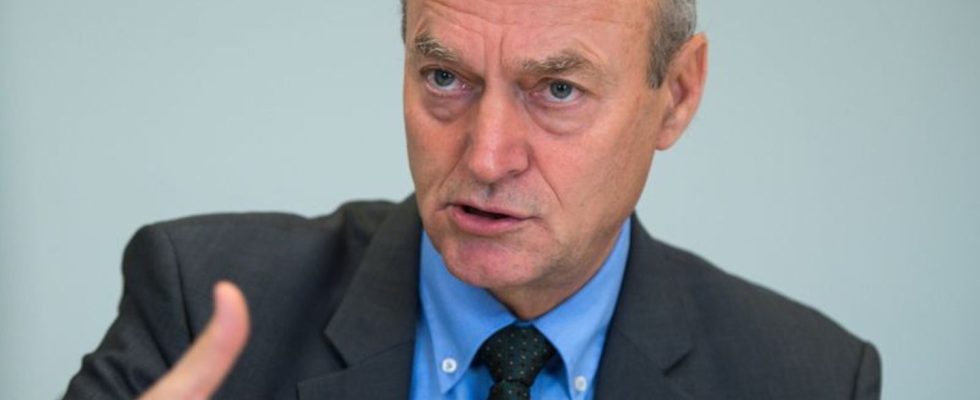secret services
Ex-President: BND’s capabilities too severely curtailed
Gerhard Schindler, former president of the Federal Intelligence Service (BND), calls for “an urgent strengthening of the service’s operational capabilities.” photo
© picture alliance / dpa
The traffic light coalition has accused the Federal Intelligence Service of informing too late about the uprising of the Russian mercenary leader Prigozhin. That should also concern the Bundestag.
Former BND President Gerhard Schindler has reproached politicians for the capabilities of the Federal Intelligence Service to have cut too much in recent years. “Anyone who puts one legal chunk after another in the way of the BND shouldn’t be surprised that this has an impact on the ability to obtain information,” said the 70-year-old of the German Press Agency in Berlin. He added: “The mutation from an operating intelligence service into an administrative authority that deals with itself is politically desired. The changes in the law in recent years have brought about exactly that.”
Schindler was released in June 2016 in connection with the affair surrounding the worldwide data snooping by the US secret service NSA and BND wiretapping operations against friendly states. He had headed the German foreign intelligence service since early 2012. At the time, the Chancellery put Schindler on temporary retirement against his will.
SPD should think about transfer from BND
After the armed uprising by the head of the Russian Wagner mercenary group, Yevgeny Prigozhin, against Russian President Vladimir Putin a week ago, criticism of the BND allegedly informing the federal government too late became louder. The news portal “The Pioneer” reported that the SPD was thinking about replacing BND President Bruno Kahl, who has been in charge of the service since 2016.
Schindler now said: “Those who are calling for the president to be replaced today have themselves played a part in curtailing the powers of the BND. But distracting oneself from one’s own mistakes is not a solution to the problem.” What is urgently needed is “a strengthening of the operational capabilities of the service and a thorough scouring of the numerous legal obstacles”.
In the recently presented national security strategy of the federal government, there is talk of strengthening the intelligence services’ ability to analyze, said Schindler. The strengthening of the classic procurement of information, on the other hand, is not specified as a goal. “That’s a mistake, because I can only analyze if I also have the intelligence information on it.”
Chancellor Scholz with indirect criticism?
According to information from the dpa, the allegations against the BND in connection with the events surrounding the Wagner group are likely to play a role this Wednesday both in the Foreign Affairs Committee and in the secret Parliamentary Control Committee (PKGr) of the Bundestag, which is responsible for monitoring the secret services.
Chancellor Olaf Scholz (SPD) said last week on the ARD program “Maischberger” with a view to the Prigozhin uprising that the intelligence services in Germany “of course didn’t know that beforehand”. He added: “But they kept telling us what was to be observed.” The statements were understood in parliament as indirect criticism of the BND.
Scholz announced that he wanted to discuss the flow of information with the allies. Responding to reports that US intelligence agencies allegedly knew earlier, he said: “We’ll all have to discuss that together – including what the case is of the things that are now being speculated about.”
Criticism of the BND was raised at the weekend, especially from the ranks of the traffic light parties SPD and FDP. SPD member of the Bundestag Uli Grötsch told the “Welt am Sonntag”: “Following the “unnoticed” seizure of power by the Taliban in Afghanistan, the scandal surrounding a double agent in December last year and the attack on the Nord Stream 2 pipeline, the current reporting again paints a bad picture of the BND’s networking with other major intelligence services.” Grötsch is a PKGr member. He announced that the BND would have to ask uncomfortable questions at its next meeting.
FDP spokesman: “The information was obviously thin”
The head of the Bundestag’s Afghanistan investigative committee, Ralf Stegner (SPD), told the “Spiegel”: “We have now been surprised by the events too often.” The foreign policy spokesman for the FDP parliamentary group, Ulrich Lechte, criticized: “The BND’s information on the inner workings of Russia was obviously thin.” MP Sara Nanni (Greens) told the newspaper: “The situation is definitely frustrating.” But it is far too easy to look for the mistakes in the BND. All of this is “also a question of resources”.
A week ago, Wagner boss Prigozhin occupied the southern Russian city of Rostov-on-Don and then had his fighters march towards Moscow. He surprisingly gave up around 200 kilometers from the Russian capital. Putin assured Prigozhin and his mercenaries of impunity.

